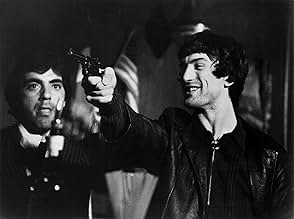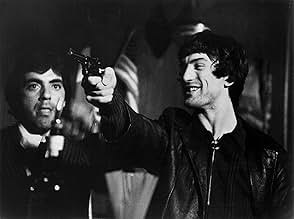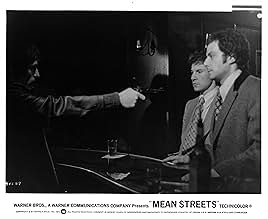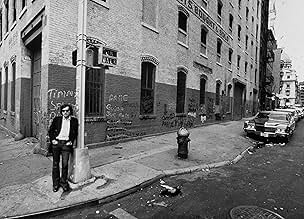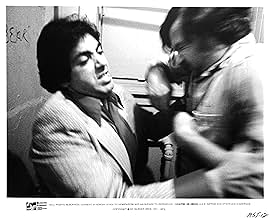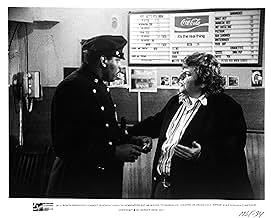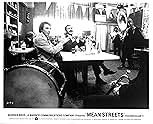Em Little Italy, na cidade de Nova York, um mafioso devoto católico precisa conciliar seu desejo de poder, seus sentimentos por sua namorada epiléptica e sua devoção por seu amigo problemáti... Ler tudoEm Little Italy, na cidade de Nova York, um mafioso devoto católico precisa conciliar seu desejo de poder, seus sentimentos por sua namorada epiléptica e sua devoção por seu amigo problemático.Em Little Italy, na cidade de Nova York, um mafioso devoto católico precisa conciliar seu desejo de poder, seus sentimentos por sua namorada epiléptica e sua devoção por seu amigo problemático.
- Direção
- Roteiristas
- Artistas
- Prêmios
- 5 vitórias e 5 indicações no total
- Mario
- (as Vic Argo, Victor Argo)
- Oscar
- (as Murray Mosten)
Avaliações em destaque
It has been years since I saw this film and I noticed that I had last watched it before I started reviewing. As a result I watched it again yesterday to refresh my memory. Seeing it with older eyes is an impressive experience because I appreciate what Scorsese has gone on to do and found it fascinating to look back on this, one of his earliest films. The plot is a mash of characters and events that come together to create a sense of place that is convincingly done; the overall narrative focuses on Charlie, in particular where his relationships are taking him but this aspect ebbs and flows with the events. It is funny, violent, personal and engaging, only a few aspects come over as weak. The script flows like real dialogue, producing the different moods of each scene and also being memorable and rough.
The style and direction of the film are impressive and it is interesting to see the influence Scorsese had with this and his other films. The techniques employed here will ring bells with anyone who watches modern cinema and television with more than a passing interest, Sopranos in particular owes him a debt. Here we have the slow-motions, chest-mounted camera (I'm sure there is a proper name for it), impressive use of music and so on that we have come to be used to with Scorsese and one cannot help be impressed by how well developed these ideas were at an early stage in his career. Of course along with stylistic constants, several of the cast would become regulars. Keitel is the heart of the film for me and, although his opportunities in the script are surprisingly limited, I felt he did well with the themes handed to him. De Niro of course catches the eye more because of what was to come but also because he has the more energetic character. Robinson didn't make much of an impression on me but the support cast features early turns from faces such as Proval, Romanus, Argo and others.
Mean Streets might be a bit rough and ready when placed next to the polished films that Scorsese would go on to do but it does not take away from its strengths to look back at it. So much of Scorsese's style and calling cards are in place even at this early stage and his film convincingly creates the streets and characters of the place. The main players involved have done better films since this one but it is still strong, stylish and interesting and definitely worth a look for anyone who has since any other Scorsese films.
Despite its drawbacks (mainly due to youth and inexperience), the template was set. The opening credits (done to the tune of "Be My Baby") suck you right into the film, and the rest of the movie is peppered with Scorsese's loving treatment of popular music that would later become one of his most endearing hallmarks. The basic premise featuring Harvey Keitel as Charlie (the young hood with a heart of gold and conflicted internally by the religion of the Church and the religion of the Streets), Robert DeNiro as Johnny-Boy (the equally loved and hated loose-canon brother figure), and Amy Robinson as Theresa (the woman our hero wants to put on a pedestal as a saint but often treats like a whore), is a trifecta of archetypes we see repeated again and again in Scorsese's films (most obviously in "Casino" with the DeNiro-Pesci-Stone characters, and most subversively in "The Last Temptation of Christ" with Jesus-Judas-Mary Magdalene). The religious iconography, the brotherhood of crooks, the attraction to the gangster lifestyle, the keen eye for depicting violence in artistic and startling ways...these are displayed here in "Mean Streets" in their rawest form.
Though flawed in many ways, "Mean Streets" set the stage and laid the the template for the type of film Scorsese would perfect seventeen years later with "Goodfellas." This heralded the arrival of a new talent and a new genre, and the world of film has thankfully never been the same.
Harvey Keitel leads the film with an inner turmoil that's great to witness. Overall, it's a very restrained performance which works so well since he's repressing all of his troubles. Seeing Robert De Niro in a role like this really shows how far he's come as this volatile and juvenile performance is almost unrecognizably him.
As director, co-writer and co-editor, Martin Scorsese has a fully formed vision. His usual themes are present, the editing mostly has the rhythm of his later work and New York is definitely a character in itself. Another signature trait of his work are the needle drops and there's a terrific selection of them on display in this.
What Scorsese Film Ranks Highest on IMDb?
What Scorsese Film Ranks Highest on IMDb?
Você sabia?
- CuriosidadesFrancis Ford Coppola contributed money to the budget of the film. However, it is rumored that he lent Martin Scorsese $3000 as the Mafia shook him down for using the San Genaro Festival as a backdrop without "permission". It's generally presumed the Mafia uses the all-cash festival to launder money from their ill-gotten gains.
- Erros de gravaçãoYou can see Robert De Niro's mic pack on his back when he gets up to walk to the window at Charlie's house after staying the night.
- Citações
[first lines]
Voice in Charlie's Mind: You don't make up for your sins in church. You do it in the streets. You do it at home. The rest is bullshit, and you know it.
- Versões alternativasNBC edited 10 minutes from this film for its 1977 network television premiere.
- ConexõesEdited into American Cinema: Film Noir (1995)
- Trilhas sonorasJumpin' Jack Flash
Written by Mick Jagger (as M. Jagger), Keith Richards (as K. Richards) (uncredited)
By The Rolling Stones
Courtesy of ABKCO Records
Principais escolhas
- How long is Mean Streets?Fornecido pela Alexa
Detalhes
- Data de lançamento
- País de origem
- Central de atendimento oficial
- Idiomas
- Também conhecido como
- Calles peligrosas
- Locações de filme
- Empresas de produção
- Consulte mais créditos da empresa na IMDbPro
Bilheteria
- Orçamento
- US$ 500.000 (estimativa)
- Faturamento bruto nos EUA e Canadá
- US$ 32.645
- Fim de semana de estreia nos EUA e Canadá
- US$ 32.645
- 15 de mar. de 1998
- Faturamento bruto mundial
- US$ 61.676
- Tempo de duração1 hora 52 minutos
- Cor
- Proporção
- 1.85 : 1





